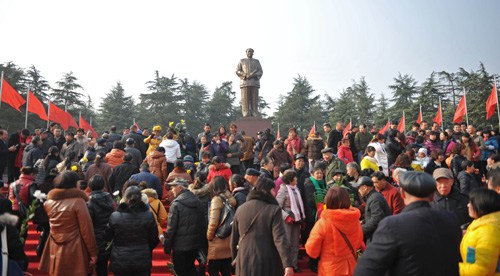|
 |
|
COMMEMORATIVE SYMPOSIUM: The top Chinese leadership attends a symposium commemorating Mao Zedong's 120th anniversary on December 26, 2013 at the Great Hall of the People in Beijing (RAO AIMIN) |
Mao Zedong, a man whose name is inseparable with the birth of the People's Republic of China (PRC), has long been regarded as a symbol of the Chinese Communist Revolution. Now, his lasting influence has been reaffirmed through his 120th anniversary.
President Xi Jinping, along with other top Chinese leaders, visited the Chairman Mao Zedong Memorial Hall, located at Tiananmen Square in the center of downtown Beijing , on December 26, 2013, which was Mao's birthday.
Mao held chairmanship of the Central Committee of the Communist Party of China (CPC) from 1945 until his death on September 9, 1976. He was also China's head of state between October 1949 and April 1959.
After the visit, the leaders attended a commemoratory symposium at the Great Hall of the People.
At the symposium, Xi hailed Mao as "a great patriot and national hero" and the core of the first generation of the Chinese leadership. "Mao is a great figure who changed the face of the nation and led the Chinese people toward their new destiny," said Xi, also General Secretary of the CPC Central Committee.
"Holding high the banner of Mao Zedong Thought should not be compromised at any time, and we will hold that banner high forever," the president quoted late Chinese leader Deng Xiaoping as saying.
Pervasive influence
Born on December 26, 1893, Mao grew up in a China that faced struggles both outside its borders and within.
After decades of perseverance, Mao and his comrades founded the PRC in 1949, which ended the oppression and aggression by foreign forces and achieved the independence and liberation of the Chinese nation.
Mao Zedong Thought, which emphasizes seeking truth from facts, the "mass line" and independence, is still the long-term guiding principle for CPC governance.
On December 26, people queued up in front of Mao's memorial hall in Tiananmen Square. A military officer surnamed Su, who has visited the memorial hall on Mao's birthday every year, said, "Each visit has given me new inspirations."
Several tens of thousands of admirers chose to pay tribute to Mao at his birthplace—Shaoshan in central China's Hunan Province. A plain open banquet of longevity noodles and small spicy fish warmed the stomachs and hearts of visitors on December 26.
"The small spicy fish is a must, as it was Chairman Mao's favorite 'taste from home'," according to a villager in Shaoshan who was busy serving the swarms of visitors.
"There's free food and I feel such a family-like atmosphere here in Mao's hometown. Shaoshan touches our generation's hearts in its own special way," said Fan Huiling, a 49-year-old woman who has been looking forward to her trip to Shaoshan for a long time. Setting foot in the village has allowed Fan to realize her lifelong dream of a "personal visit to the birthplace of the great man."
"Chairman Mao is indeed a great man and his great contributions deserve remembrance from our country's younger generation," said Ren Bin, a 22-year-old college student from Xiangtan City, Hunan Province.
It was Ren's eighth trip to the village as his parents were also great appreciators of Mao. His mother and father have a collection of Mao's poetry and badges.
Across China, a variety of events were held to commemorate Mao around his birthday.
"I don't think there is a geographical, age or social class division in regard to people's attitude toward Mao," said Huang Jisu, a sociologist, playwright and cultural critic in Beijing. "He is regarded as one of the most influential and decisive figures in China's modern history."
In Huang's view, the greatest good that Mao did for the nation was the Chinese revolution that he led, which ended the crisis of survival the nation had faced for more than a century.
"Some quotes from Mao are still very popular in China, even among youngsters," said Wu Bo, a 19-year-old student from Peking University. "Although some young people regard the days of Chairman Mao as the distant past, we cannot deny that his influence still lingers through our parents to us."
| 